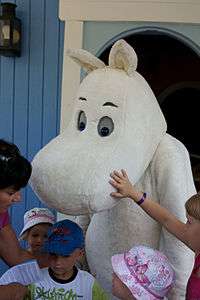Moomintroll
| Moomintroll | |
|---|---|
| Moomin character | |
 Moomintroll in Moomin World theme park, Naantali, Finland. | |
| First appearance | The Moomins and the Great Flood |
| Created by | Tove Jansson |
| Information | |
| Gender | Male |
| Family |
Moominpappa (father) Moominmamma (mother) |
Moomintroll (Swedish: Mumintrollet) (Also known as Moomin) is the main protagonist in the Moomin books by Tove Jansson.[1] He lives in the Moominhouse together with his father Moominpappa and his mother Moominmamma and has a keen spirit of adventure. Moomintroll is a 'moomin' - a little white troll with a hippopotamus-like big round nose.[2]
His best friend is Snufkin.[3] Other friends include Sniff and Little My. It is hinted many times that he is in love with the Snork Maiden.
The asteroid 58345 Moomintroll was named in his honour.
Appearances
Moomintroll appears in the following books:
- The Moomins and the Great Flood – A young and scared Moomintroll (or The Little Troll as he is first called) and his Moominmamma are traveling through a deep forest and sail the "ocean" in search of his Moominpappa.[4]
- Comet in Moominland – A more adventurous Moomintroll and his scared friend Sniff dive for pearls, find a cave and travel to the observatory to ask questions about the comet.[5] He meets Snufkin for the first time and gets a rare opportunity to comfort him. He also sees, falls in love with, saves and dances with the Snork Maiden.[6]
- Finn Family Moomintroll
- The Exploits of Moominpappa – Moominpappa tells Moomintroll and some of his friends the story of his early life.
- Moominsummer Madness
- Moominland Midwinter – Moomintroll wakes from his hibernation in the middle of winter. The winter world is a new, lonely and scary place for him, and his mentor, Too-Ticky, guides him through the mysteries. In this new situation he has to grow up and leave his childhood paradise.[7]
- Tales from Moominvalley Moomintroll appears in four of the nine short stories. "The Last Dragon In the World" in which he finds a small dragon that he wants to love him, but it does not even like him. "The Invisible Child" in which he tries to play with the invisible girl, Ninny, but when she don't know how to play, he leaves her alone. "The Secret of the Hattifatteners" in which he is just mentioned as a part of the family. "The Fir Tree" in which the whole family tries to comfort Christmas.
- Moominpappa at Sea – Whole new emotions awaken in Moomintroll. His sexuality begins to take form when he falls in love with one of the beautiful and unobtainable seahorses. He manages to get a form of relationship with The Groke.[8] During a storm Moominpappa and Moomintroll have to save a fisherman, and for the first time Moomintroll is respected as Momminpappa's equal.[9] Moomintroll is now a teenager.[10]
- Moominvalley in November – Moomintroll does not appear directly in the book, but while the rest of the moomin family is often mentioned, Moomintroll is not mentioned until the very end of the book when Snufkin returns to the Moominvalley.[11]
Reception
The character has a mostly positive reception from critics.[12][13]
See also
References
- ↑ "The Guardian view on Moomintroll: a hero for our time". 16 December 2016. Retrieved 16 December 2016 – via The Guardian.
- ↑ "Big in Japan, but could America love Moomin?". Reuters. 2009-10-06. Retrieved 2011-10-01.
- ↑ Jones 1984, pp. 65–66.
- ↑ Jones 1984, pp. 20–21.
- ↑ Jones 1984, pp. 25–26.
- ↑ Jones 1984, p. 29-31.
- ↑ Jones 1984, pp. 63–66.
- ↑ Jones 1984, p. 86.
- ↑ Jones 1984, p. 88.
- ↑ Jones 1984, p. 93.
- ↑ Westin 2007, pp. 11.
- ↑ Norrman, Ralf; Haarberg, Jon (1 June 1980). "Nature and language: a semiotic study of cucurbits in literature". Routledge & Kegan Paul. Retrieved 16 December 2016 – via Google Books.
- ↑ "Books from Finland". Publishers' Association of Finland. 1 January 1991. Retrieved 16 December 2016 – via Google Books.
Bibliography
- Jones, W. Glyn (1984). Vägen från Muminsalen (in Swedish). Hangö: Bonniers. ISBN 91-0-046191-1.
- Westin, Boel (2007). "A painter's reflection: The self-representational art of Tove Jansson". In McLoughlin, Kate; Brock, Malin Lidström. Tove Jansson Rediscovered. Cambridge Scolars Publishing. ISBN 978-1-84718-269-2.
This article is issued from
Wikipedia.
The text is licensed under Creative Commons - Attribution - Sharealike.
Additional terms may apply for the media files.